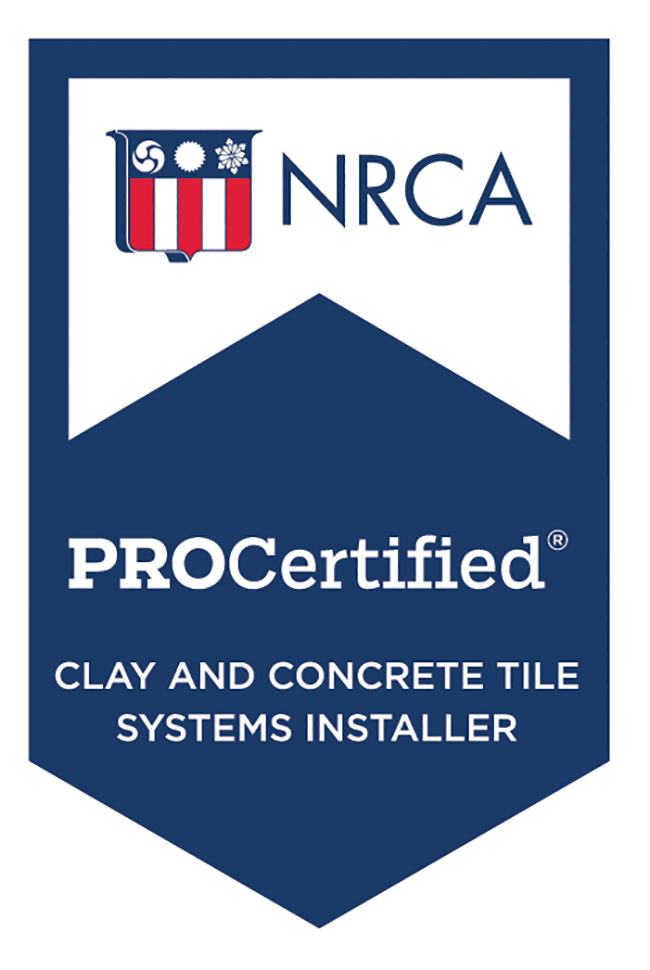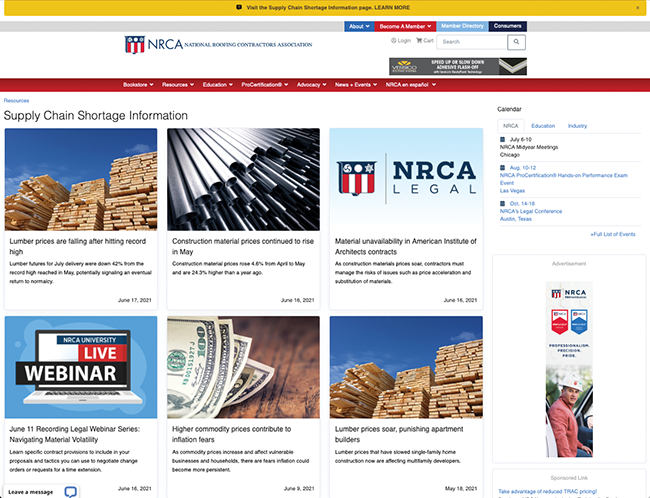NRCA launches second season of inspiring podcast series

|
NRCA has launched the second season of its podcast series, Stories of an Extraordinary Industry. The purpose of the podcast is to enlighten, educate and inspire by sharing roofing professionals’ firsthand accounts of their meaningful experiences and stories in the industry.
In the first episode of the new season, “Two Simple Words,” sponsored by NRCA’s Qualified Trainer Conference, Rod Petrick, president of Ridgeworth Roofing Co. Inc., Frankfort, Ill., and NRCA’s chairman of the board, shares the story of how his multigenerational family business overcame challenges and created friendly competition among a community of industry competitors.
NRCA will release a new podcast episode biweekly, and the second season of the podcast will have 13 episodes. Episodes are available at roofingstories.podbean.com; on NRCA’s website at nrca.net/news-events/podcast; or wherever you get your podcasts, including Apple, Google, iHeartRadio, Spotify and Stitcher.
NRCA launches clay and concrete tile installer certification

|
NRCA has announced experienced installers who demonstrate substantial skills and knowledge of clay and concrete tile roof systems can apply to become NRCA ProCertification® Clay and Concrete Tile Systems Installers. The new certification was developed with support from the Tile Roofing Industry Alliance.
NRCA ProCertified is NRCA’s national certification initiative to create a competent, sustainable and high-performing roofing industry workforce. Certifications now available include NRCA ProCertified Asphalt Shingle Systems Installer, NRCA ProCertified Clay and Concrete Tile Systems Installer, NRCA ProCertified EPDM Systems Installer, NRCA ProCertified Thermoplastic Systems Installer and NRCA ProCertified Roofing Foreman.
Learn more about NRCA ProCertification at nrca.net/procertification.
OMG® names new senior vice president for business development
 Kelly Kelly
|
OMG Inc., Agawam, Mass., has named Josh Kelly senior vice president for business development. In the role, Kelly will focus on strategic growth opportunities, including mergers and acquisitions, product development, licensing and strategies to expand OMG’s business.
“Josh is uniquely qualified to fill this key position,” says Hubert McGovern, OMG’s president and CEO. “He has a deep knowledge of our OMG Roofing Products and FastenMaster businesses and markets. He also has a proven track record for developing disruptive technology, the best example of which is our industry-leading RhinoBond induction welding system. He will play a critical role on the senior management team at OMG.”
Kelly started with OMG in 1991 as a project coordinator and has held several positions within the roofing division, including key account manager, vice president of marketing, general manager, and vice president of product development and innovation. He is a member of the Single Ply Roofing Industry association and a past president of The Roofing Alliance. Kelly also currently serves on NRCA’s board of directors.
Higher commodity prices contribute to inflation fears
Commodity price increases are threatening global economic recovery, affecting vulnerable businesses and households and exacerbating fears that inflation could become more persistent, according to The Wall Street Journal.
Commodity price increases are occurring across the board. Lumber, iron ore and copper have hit records; corn, soybeans and wheat have hit their highest levels in eight years; and oil reached a two-year high in June.
Economists and central bankers typically try not to be too concerned about commodity price moves because they can be volatile and make up a smaller part of consumer inflation than costs such as housing. However, manufacturers’ profit margins are shrinking because of higher costs for raw materials, and households are paying more for gas, groceries and some restaurant bills, which affects their ability to spend elsewhere.
Many factors are driving the increases, including strong consumer demand and supply-chain shortages. Many economists say it is a deliberate decision by policymakers in the U.S. and elsewhere to run their economies hot for now, with lots of stimulus, to ensure they recover fully from damage caused by the COVID-19 pandemic.
Central bankers must decide whether to move faster to cool demand through rate rises or other methods. During a similar situation in the 1970s, many countries prioritized jobs and growth over controlling consumer prices during a series of oil shocks and experienced high inflation.
European Central Bank Chief Economist Philip Lane recently said high unemployment would help keep inflation under control because a strong labor market is needed to cause more persistent inflation.
Commodities mainly are used for producing goods as opposed to services, which are a bigger part of developed-world economies. Goods make up about 20% of the weighting of the U.S. consumer price index.
Academic work also suggests the effects of commodity-price shocks on inflation have fallen in recent decades as elements such as branding have become important in final costs. Additionally, commodities play a smaller role in final production as businesses become more efficient.
However, surging commodity prices also can be an early warning of future inflation because commodity markets react more rapidly to changes in the economy than prices for final goods. The effects of climbing oil prices already are showing up in consumer price data. For example, figures for the eurozone showed consumer prices were 2% higher in May than a year earlier, the fastest rise since late 2018. In the U.S., it now costs an average of $1.02 per gallon more to fill up a gas tank than a year ago.
Economists note some commodity prices, such as crude oil, are merely returning to pre-pandemic levels. Many also believe commodity price growth will subside later this year as some U.S. consumer spending shifts to services.
Raw materials shortage plagues the construction industry

|
The construction industry is contending with a widespread shortage of raw materials, a lingering effect of the COVID-19 pandemic.
The costs of materials have been increasing, and supply chains have been disrupted as restrictions, tariffs and other factors cause delays.
Roofing contractors should expect longer lead times and less availability regarding raw materials. The shortages are affecting virtually every manufactured component in the roofing industry, and the supply issues are expected to continue for at least several months.
It is important roofing contractors stay aware regarding these issues and plan accordingly. There may be a need to adapt until the shortage issues are resolved. NRCA has made available a Supply Chain Shortage Information webpage to help its members stay up to date with the latest news regarding materials shortages and price hikes in the industry.
The new page houses a recording of NRCA’s April 22 Live Action Alert: Supply Chain Shortages, during which NRCA CEO Reid Ribble and NRCA Vice President of Technical Services Mark Graham discuss the materials shortage issue facing the roofing industry. And recordings of two webinars during which Trent Cotney, CEO of Cotney Attorneys & Consultants, Tampa, Fla., and NRCA’s general counsel, addresses legal issues associated with the materials shortage also are available.



